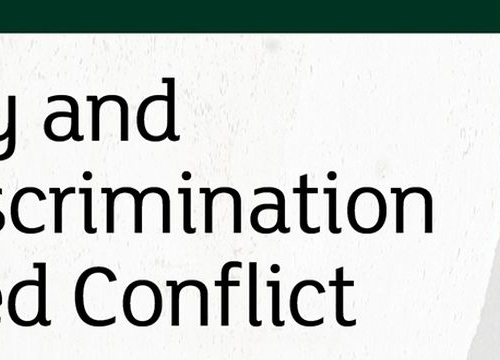Book Launch: ‘Equality and Non-Discrimination in Armed Conflict, Humanitarian and Human Rights Law in Practice’
Event
This event marks the launch of our LLM alumnus and former teaching assistant George Dvaladze’s book ‘Equality and Non-Discrimination in Armed Conflict, Humanitarian and Human Rights Law in Practice’ published by Edward Elgar Publishing.
Discrimination is often the root cause of, or it is intrinsically linked to, armed conflict. The realities of such situations can also exacerbate inequalities that predate the outbreak of the conflict. Although expressly prohibited under international law, discrimination is among the humanitarian issues that adversely impact persons, communities, and society at large, in all types of armed conflicts. The book unpacks the complexity of the international legal regulation of guarantees of equality and non-discrimination applicable in armed conflict.
Addressing a significant shortage in legal literature, the book analyses an array of sources of international humanitarian law (IHL) and human rights law to define a method to distinguish between prohibited discrimination and other differentiations in armed conflict that are permitted or even required by law.
The author and leading experts in IHL and human rights will discuss humanitarian and legal issues pertaining to equality and non-discrimination in armed conflict, based on the findings presented in the book.
INTRODUCTION AND MODERATION
- Gloria Gaggioli, Director, Geneva Academy and Associate Professor, University of Geneva Law Faculty
PANELISTS
- George Dvaladze, Regional Legal Adviser for South Asia, International Committee of the Red Cross
- Marco Sassòli, Professor, University of Geneva Law Faculty
- Mona Rishmawi, Former Chief of the Rule of Law, Equality and. Non-Discrimination Branch in the Office of the High. Commissioner for Human Rights (OHCHR)
APERITIF
The event will be followed by an aperitif.
Disclaimer
This event may be filmed, recorded and/or photographed on behalf of the Geneva Academy. The Geneva Academy may use these recordings and photographs for internal and external communications for information, teaching and research purposes, and/or promotion and illustration through its various media channels (website, social media, newsletters, annual report, etc.).
By participating in this event, you are agreeing to the possibility of appearing in the aforementioned films, recordings and photographs, and their subsequent use by the Geneva Academy.








